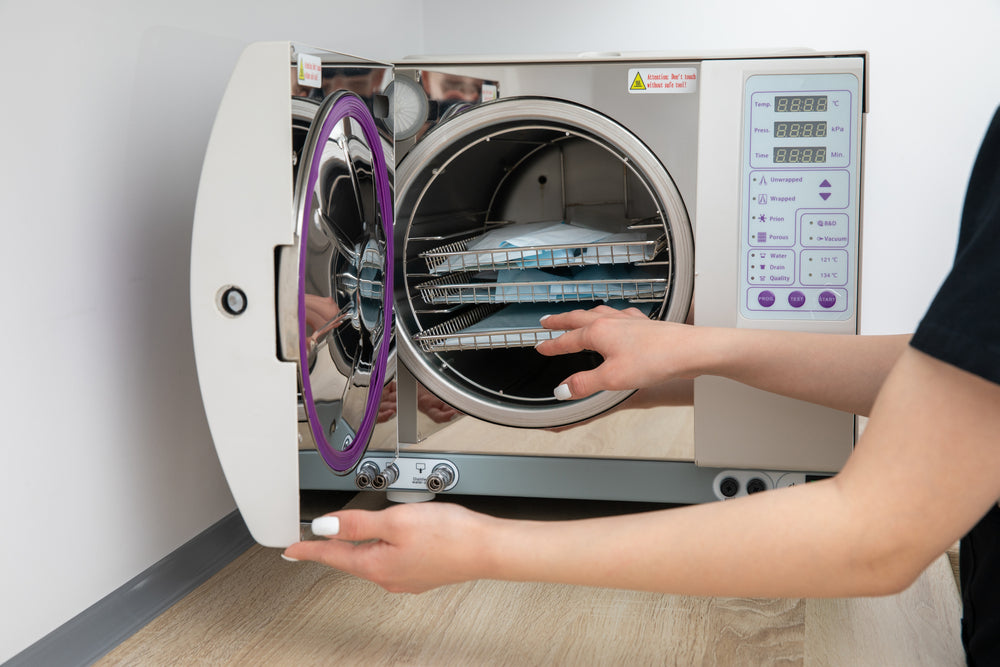An autoclave is used in sterilising various pieces of medical/lab equipment and waste. Without water, a steam autoclave would not be able to sterilise any type of load that requires sterilisation. Simply put, water is the most important component when it comes to the proper functioning of an autoclave.
In addition to dictating the type of loads that can be sterilised, the type of water used in an autoclave also has a huge impact on its lifespan. You can use different types of water in an autoclave, including tap water, deionised water and distilled water.
Read on below to find out what type of water should be used in an autoclave, in order to maximise the efficiency, effectiveness and longevity of this important and costly piece of sterilisation equipment.
What Is Dental Clinic Disinfection?
The process of removing any or all pathogenic microorganisms on inanimate objects in a clinical setting is referred to as clinic disinfection. The main aim is to ensure that these microorganisms no longer pose a threat to any clients or patients. A steam autoclave is one of the main pieces of sterilisation equipment used in clinic disinfection.
How Can Tap Water Damage My Autoclave?
While it is possible for you to use tap water in an autoclave, it is not encouraged – at least not for an extended period. Municipal water has a huge amount of impurities, salts and dissolved minerals. This means that it is bound to leave substantial scale deposits when it is turned into pressurised steam in an autoclave.
The accumulation of mineral deposits and salt in the tiny pipes and valves within the autoclave decreases efficiency. Furthermore, you will be required to clean the autoclave more frequently in order to clear the build-up. Using tap water for an extended period of time can lead to the premature destruction of your autoclave.

Why Water Quality Is Important
When Using An Autoclave Mineral impurities in water can lead to the accumulation of mineral deposits in an autoclave. When left unchecked, these deposits can cause significant damage to various components of the autoclave:
- Scale Build-Up: Scale can severely affect the functioning of a generator. A scale build-up in the water level sensor tubes can prevent the proper function of the water level sensor elements; potentially leading to the failure of the heater.
- Calcium Deposits: If the scale falls into the shell of the generator, it can end up forming calcium deposits. These deposits can, in turn, end up causing shorts or overheating in the heating elements due to their conductive properties.
To avoid the above issues, and ensure that the water that feeds into your autoclave is of the right quality, you might consider using distilled or dionised water – provided that it is the suitable choice for the brand of autoclave in use. Alternatively, you can install a reverse osmosis system on your municipal water line for convenient and efficient water purification.
What To Do If The Autoclave Is Damaged Because Of Poor Water Quality
- Minimal Damage: For any boiler that is not fed with purified water, consider using the automatic blow-down feature to drain out any scale build-up.
- Mild Damage: If the damage appears to be recurrent in nature, consider installing a reverse osmosis system to ensure that you only feed purified water into the boiler/autoclave.
- Severe Damage: You might have to replace the boiler/autoclave if the damage caused by scale build-up appears to be irreversible.
Buy The Best Autoclaves For Your Dental Practice
Now that you have a clear idea of the type of water that should be used in an autoclave, ensure that you safeguard the well-being of your clients and patients by using the best autoclaves to sterilise all your dental equipment.
Medical Equipment Services is one of the pioneers and leading suppliers of quality dental equipment, tools and supplies. We offer a wide variety of products that are made from the finest materials to ensure durability and reliability. Customer service and satisfaction are our top priorities, and we are proud to offer the best products and prices in the market. Should you wish to learn more about our products or services, please do not hesitate to contact us for an extensive list of products we offer.
Please call us today on 1300 342 013 or leave an enquiry.


